The best day trading brokers in the UK combine low spreads, fast execution, and FCA regulation for secure, real-time trading.
Platforms like IG, Pepperstone, and Interactive Brokers stand out for their advanced charting tools, tight spreads, and multi-asset access. Each offers demo accounts, mobile apps, and leverage controls suited for both new and experienced traders.
When choosing a broker, compare execution speed, margin rates, and platform usability. FCA-regulated providers ensure client fund protection through FSCS coverage up to £85,000, and transparent pricing structures that align with UK trading standards.
Quick answer: What are the best day trading platforms in the UK?
The best day trading brokers in the UK are eToro, XTB, and IG. eToro is FCA-regulated and ideal for social trading with access to global markets. XTB stands out for its low spreads, strong educational tools, and advanced xStation 5 platform. IG offers powerful charting features, 24-hour trading, and the widest market access among UK brokers. All three provide fast execution, mobile trading, and demo accounts suited to active traders.
|
Primary Rating:
4.8
|
Primary Rating:
4.7
|
Primary Rating:
4.5
|
|
Description: 30 million users globally trust eToro for their social trading needs, benefiting from a vast array of stocks, funds, ETFs, forex, commodities, and cryptocurrencies. |
Description: A reliable trading platform offering a wide range of markets, advanced tools, and educational resources to empower traders of all skill levels. |
Description: Award-winning trading platform offering extensive market access and advanced tools for both beginner and experienced traders. |
|
Pros:
|
Pros:
|
Pros:
|
|
Disclaimer:
61% of retail CFD accounts lose money.
|
Disclaimer:
73% of retail investor accounts lose money when trading CFDs with this provider.
|
Disclaimer:
69% of retail investor accounts lose money when trading CFDs with this provider. You should consider whether you can afford to take the high risk of losing your money.
|
30 million users globally trust eToro for their social trading needs, benefiting from a vast array of stocks, funds, ETFs, forex, commodities, and cryptocurrencies.
- User-friendly platform for beginners
- Copy the moves of professional traders
- Social trading & educational features
A reliable trading platform offering a wide range of markets, advanced tools, and educational resources to empower traders of all skill levels.
- User-friendly platforms with intuitive design
- Wide range of instruments, including forex, stocks, and CFDs
- Comprehensive educational tools and webinars
Award-winning trading platform offering extensive market access and advanced tools for both beginner and experienced traders.
- User-friendly platform with advanced trading tools
- Comprehensive educational resources and demo account
- Wide range of markets
6 best day trading platforms ranked
Here’s a quick overview of the best day trading brokers in the UK, based on expert testing and platform performance.
Your capital is at risk.
- eToro – Best overall
- XTB – Best for advanced day traders
- IG – Best for a range of investment options
- Plus500 – One of the best brokers for beginners
- Spreadex – Best for tight spreads
- Trade Nation – Best for fixed spreads
What are the best day trading platforms in the UK?
This comparison is based on five key criteria that every trader should evaluate before choosing a broker.
| Rank | Brokers | Minimum deposit | S&P 500 CFD spread (average) | Commission | Types of assets |
|---|---|---|---|---|---|
| 1 | eToro | $50 | 0.8 | 0% | Stocks, indices, ETFs, currencies, commodities, crypto |
| 2 | XTB | £0 | 0.6 | 0% | Forex, indices, commodities, stocks, ETFs, CFDs |
| 3 | IG | £250 | 0.4 | Varies | Real stocks & ETFs, exchange-traded securities, CFDs (currency pairs, stock indices, stocks, ETFs, commodities, crypto, bonds, and futures) |
| 4 | Plus500 | £100 | 0.7 | 0% | CFDs on forex, commodities, indices, options, stocks, ETFs |
| 5 | Spreadex | £0 | 0.6 | 0% | CFDs on stocks, forex, ETFs, indices, commodities, futures, sporting events |
| 6 | Trade Nation | £0 | 0.5 | 0% | Forex, CFDs on stock indices, stocks, commodities, bonds, crypto |
Day trading platform reviews
In 2023, around 42% of UK adults invested or traded, up from 36% in 20211, reflecting strong growth in retail trading.
Choosing a trusted day trading broker is essential for beginners seeking fair pricing, safety, and reliable execution.
This guide ranks the best day trading brokers in the UK using five key criteria: minimum deposit, S&P 500 CFD spread, commission, platform fee, and asset range.
Each broker was also evaluated for FCA regulation, usability, research tools, education, and trading features to ensure accuracy and relevance for UK traders.
You can also read about how we test brokers here.
This article was reviewed by Tobi Opeyemi Amure, a trading expert and writer at Investopedia, Investing.com, and Trading.biz.
1. eToro – Best overall

Is eToro safe?
eToro’s safety is reinforced by its authorisation and registration from the Financial Conduct Authority (FCA), Australian Securities & Investment Commission (ASIC), and the European Union via MiFID.
eToro stores client funds in trusted banks and uses SSL encryption for data protection. They provide a Two Factor Authentication (2FA) option for your account.
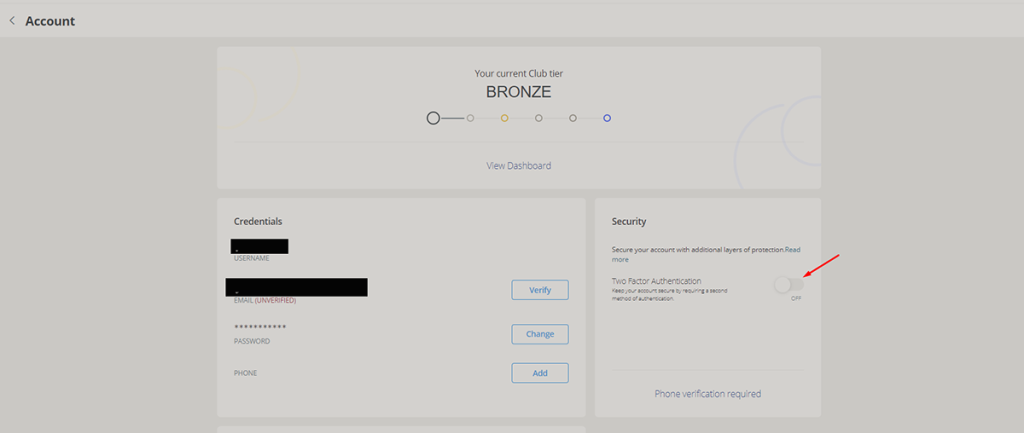
eToro currently has over 33 million users worldwide2 and has a 4.4-star rating on Trustpilot from over 21,000 reviews.

What can I trade on eToro?
eToro offers a total of over 4,000 tradeable instruments.
You can trade real stocks, ETFs, cryptos, CFDs, indices, commodities, and forex.
- Stocks: 3,200
- Currencies: 52
- Commodities: 32
- Crypto: 74
- Indices: 20
- ETFs: 420
Does eToro charge commissions and fees?
eToro provides free stock and ETF trades. They charge low fees for forex and CFDs, but they do have a $5 withdrawal fee, conversion fee, and inactivity fee.
- Real stocks & ETFs: £0
- S&P 500 CFD (average spread): 0.8 points
- EURUSD (average spread): 1 pip
- Commodities: From 2 pips
- Indices: From 0.75 points
- Crypto: 1% fixed added to the market price (Bid-Ask spread)
- Withdrawal fee: $5
- Inactivity fee: $10 per month after one year of inactivity
Mobile trading app?
eToro’s mobile app is easy to use and matches its web platform in design. They have two apps: the main eToro app and the eToro Money app for crypto and cash transfers, both on Android and iOS.
The app has dark and light themes and synced watchlists. Its charts show five indicators, unlike the web’s 67, and miss drawing tools.
eToro Money app handles money and crypto, has a similar design, and supports social trading. Both apps ensure security with a two-step login, touch/face ID, and a good search feature.
Trading platforms?
eToro combines individual and copy trading on its user-friendly web platform.
Here, you can set up watchlists and easily find markets. The ProCharts feature provides 66 indicators, 13 tools, and different layouts. eToro’s Smart Portfolios groups traders into funds, helping both passive and active traders.
One of its biggest advantages is its CopyTrader functionality. If you’re not sure how or what to trade, this unique functionality allows you to automatically replicate the trades of successful traders on the platform.
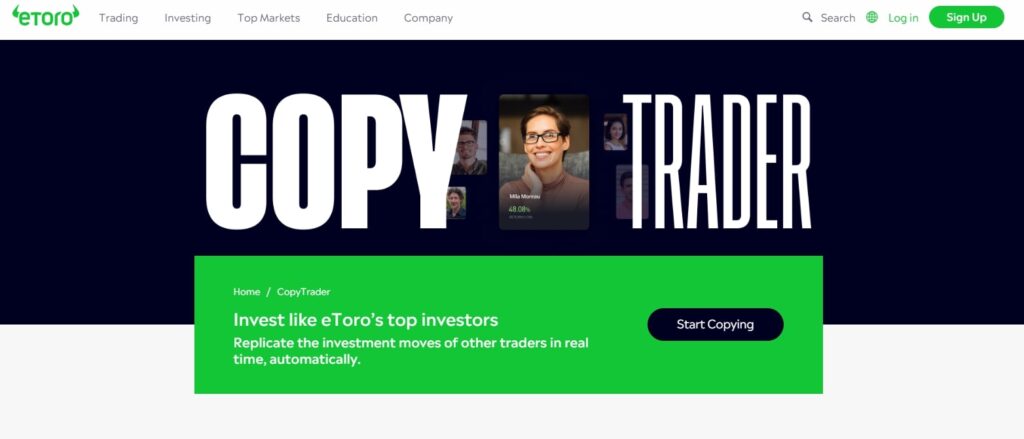
All copy trades on eToro are done by hand, setting it apart from brokers that use both manual and auto methods.
You can place orders such as Market, Limit, Stop-loss, and Trailing stop-loss. The web platform lets you set price alerts and notifications. You see notifications as icon changes or browser alerts, while mobile users get push notifications.
eToro provides clear fee reports. You can view your portfolio as an asset list or a pie chart.
Research tools and educational content?
eToro competes with top brokers with its range of improved research tools, weekly videos, and unique features such as Trading Central for certain members.
It’s strong in fundamental analysis but weaker in technical analysis, despite recent additions like eToro Plus and Weekly Crypto Roundup.
eToro’s feed, similar to Twitter, offers mixed content quality, but in-house and third-party sources are often more trustworthy.
eToro’s Learning Academy is growing however is not yet on par with competitors. The academy provides categorised videos and articles, and beginners can find useful details about trading tools on the platform.

Still, eToro’s YouTube needs clearer organisation between research, promo, and education videos.
Which type of day trader is eToro best for?
Used as a day trading broker, eToro is best suited for retail traders interested in copy trading and experienced traders willing to share their strategies. But it’s not ideal for active, high-volume traders or those interested in algorithmic trading.
Read our eToro review.
Key rating criteria:
| Minimum deposit | S&P 500 CFD spread (average) | Commission | Types of assets |
|---|---|---|---|
| $50 | 0.8 | 0% | Stocks, indices, ETFs, currencies, commodities, crypto |
Pros:
- Commission-free stock trading
- Low spreads
- Registered by top-tier authorities like FCA
- User-friendly interface
- Copy trading
- Demo/virtual trading account
Cons:
- Charges on withdrawals
{etoroCFDrisk}% of retail investor accounts lose money when trading CFDs with this provider. You should consider whether you can afford to take the high risk of losing your money.
2. XTB – Best for advanced day traders

XTB provides exceptional customer service, a vast range of forex and CFDs, and a superior trading experience through its feature-rich xStation 5 platform and extensive educational resources.
Is XTB safe?
XTB is authorised and regulated by the Financial Conduct Authority (FCA) and the European Union via MiFID.
It is listed on the Warsaw Stock Exchange and offers negative balance protection, ensuring you won’t lose more than your deposit. In addition, XTB offers segregated accounts, providing an added layer of security for traders.
What can I trade on XTB?
You can trade over 2,350 CFDs on stocks, ETFs, commodities, indices, and forex pairs.
XTB offers a total of over 5,800+ tradeable instruments, which includes access to some of the most popular global markets like the FTSE 100 and Nasdaq. Additionally, XTB offers ISA accounts.
Does XTB charge commissions and fees?
XTB delivers low trading fees and has standard non-trading fees. While they often don’t charge a withdrawal fee, they do have an inactivity fee. You can trade real stocks and ETFs without commission if your monthly trade is equivalent up to €100,000 turnover.
- S&P 500 CFD (average spread): 0.6 points
- EURUSD (average spread): 1 pip
Mobile trading app?
XTB’s xStation 5 mobile app outperforms the MetaTrader 4 app in the forex market. It provides streaming news, watchlists, an economic calendar, and long webinar-style videos.
However, the app’s charts have flaws: they don’t sync watchlists with the web and offer just 13 indicators, but they do save trend lines automatically and simplify adding indicators.
Despite this, its fast execution speeds and user-friendly design make it ideal for traders on the go.
Trading platforms?
XTB primarily recommends the xStation 5 platform, which is renowned for its design and features. xStation 5 offers charting tools, such as a candlestick countdown timer, and provides access to economic news. Please note that MetaTrader 4 is not provided.
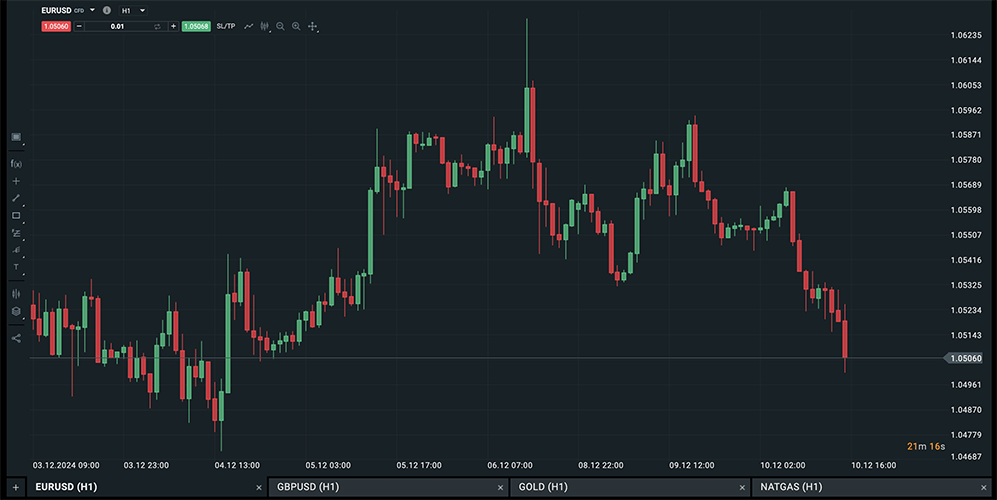
Research tools and educational content?
XTB provides quality research from its team and other sources but has fewer daily English posts than leading brokers.
Their Premium Research service offers unique strategies, news headlines, an economic calendar, and market sentiment tools.
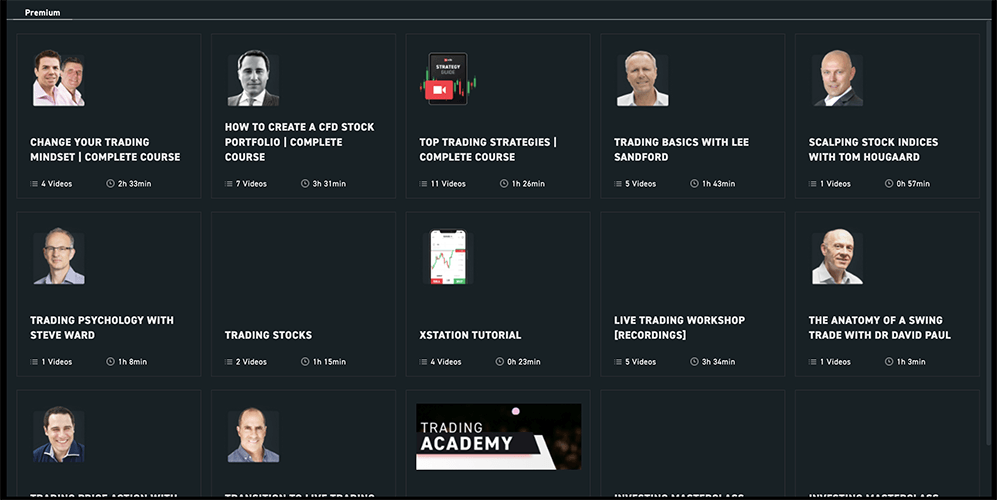
However, XTB’s platform doesn’t easily differentiate between its articles and those from third parties.
The day trading broker provides extensive educational resources, including articles, videos, and webinars. Their “Learn To Trade” section features 200 lessons, tutorials, and exclusive content for live accounts.
The academy covers forex and CFD topics, offers quizzes, and has a Masterclass video series on its platform and YouTube.
Which type of day trader is XTB best for?
XTB is a great option for traders specialising in forex and CFDs, valuing efficient account processes and versatile transaction options.
Key rating criteria:
| Minimum deposit | S&P 500 CFD spread (average) | Commission | Types of assets |
|---|---|---|---|
| £0 | 0.6 | 0% | Forex, indices, commodities, stocks, ETFs, CFDs |
Pros:
- Commission-free stocks and ETFs for investments up to 100k per month
- Free and quick deposit and withdrawal process
Cons:
- Inactivity fees
73% of retail investor accounts lose money when trading CFDs with this provider.
3. IG – Best for a range of investment options

IG is a publicly-traded, globally-regulated multi-asset broker providing a comprehensive trading package with top-notch research tools, industry-leading education, and a wide array of tradeable markets.
Is IG safe?
IG is authorised and regulated by the Financial Conduct Authority (FCA), Australian Securities & Investment Commission (ASIC), Japanese Financial Services Authority (JFSA), Monetary Authority of Singapore (MAS), Swiss Financial Market Supervisory Authority (FINMA), Financial Markets Authority (FMA), Commodity Futures Trading Commission (CFTC), and the European Union via MiFID.
IG Group, the parent company of IG, is listed on the London Stock Exchange and it provides negative balance protection for forex spot and CFD trading
What can I trade on IG?
You can trade real stocks & ETFs, exchange-traded securities, and CFDs (currency pairs, stock indices, stocks, ETFs, commodities, crypto, bonds, and futures).
IG offers a total of over 19,537 tradeable instruments, largely through CFDs and spread bets.

Does IG charge commissions and fees?
IG has low non-trading fees, including free withdrawals and an inactivity fee that only applies after 2 years. However, IG charges higher fees for real stocks compared to its competitors, while its options fees remain low.
Additionally, IG does not impose account, deposit, or withdrawal fees.
- S&P 500 CFD (average spread): 0.4 points
- EURUSD (average spread): 0.6 pip
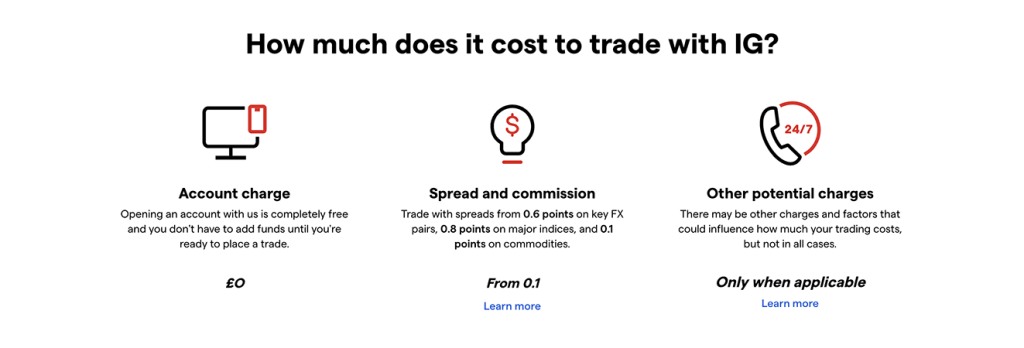
Mobile trading app?
IG’s mobile app is one of the best in the industry, boasting extensive charting features, including 30 technical indicators, 20 drawing tools, and 16-time frame options across different chart types.
While it strikes a balance between user-friendliness and depth, it’s worth noting the absence of preset watchlists or screeners, which could be a slight inconvenience when browsing its vast product offerings.
Additionally, IG provides a separate mobile app, IG Academy, for educational content.
Trading platforms?
IG provides a wide range of trading platforms and tools suitable for traders of all experience levels. Their flagship web platform is user-friendly and offers advanced charting with up to four alerts on 11 indicators, various chart types, and a tick chart.
They also offer specialty platforms like L2 Dealer for share trading and ProRealTime charts with almost 100 indicators and automated strategy support.
Integrated trading signals from PIA First and Autochartist further enhance the trading experience.
Research tools and educational content?
IG provides a wide selection of top-notch research tools, blending their resources with third-party offerings. This encompasses Reuters news, trade signals, IGTV shows, economic calendars, and daily blogs.
They also offer advanced features, such as a customisable screener, a “Recommended News” section personalised to your account, content from DailyFX, and a social network called IG Community for collaborative research and insights sharing.
IG stands out in education, providing various resources like videos, articles, webinars, and DailyFX guides. The IG Academy offers courses based on experience levels, complete with progress tracking and quizzes.
Their IG Community, consisting of 64,000+ members, adds crowd-sourced educational content. In summary, IG’s educational offerings are comprehensive and in my experience leave little room for improvement.
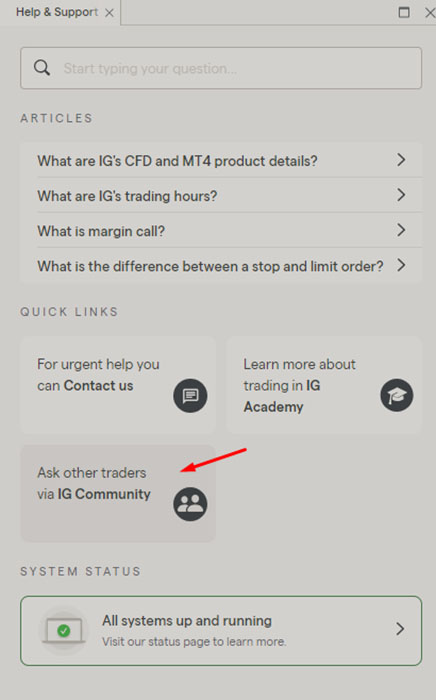
Which type of day trader is IG best for?
We recommend IG for retail forex and CFD traders seeking a trusted day trading broker with top-notch tools, research, and access to a wide range of global markets, offering over 19,500 tradeable assets.
Their web trading platform is among the best available, making IG suitable for all types of day traders.
Read our IG review.
Key rating criteria:
| Minimum deposit | S&P 500 CFD spread (average) | Commission | Types of assets |
|---|---|---|---|
| £250 | 0.4 | Varies | Real stocks & ETFs, exchange-traded securities, CFDs (currency pairs, stock indices, stocks, ETFs, commodities, crypto, bonds, and futures) |
Pros:
- Premium web trading platform
- Excellent educational resources
Cons:
- High stock fees
Spread bets and CFDs are complex instruments and come with a high risk of losing money rapidly due to leverage. 69% of retail investor accounts lose money when trading spread bets and CFDs with this provider. You should consider whether you understand how spread bets and CFDs work, and whether you can afford to take the high risk of losing your money.
4. Plus500 – One of the best brokers for beginners

Plus500 offers a prominent and trusted day trading broker, with features like online share trading, U.S. futures, and a large selection of CFDs.
Is Plus500 reliable?
Plus500 is authorised and regulated by the Financial Conduct Authority (FCA) licence number #509909, Australian Securities & Investment Commission (ASIC), Japanese Financial Services Authority (JFSA), Financial Markets Authority (FMA), Monetary Authority of Singapore (MAS), and the European Union via MiFID.
Plus500 is on the Main Market of the London Stock Exchange and offers negative balance protection for CFD trading.
What can I trade on Plus500?
You can primarily trade CFDs, including forex, stock index, stock, ETF, and commodity. However, they don’t offer popular asset classes like ETFs or options.
Plus500 offers a total of over 2,800 tradeable instruments.
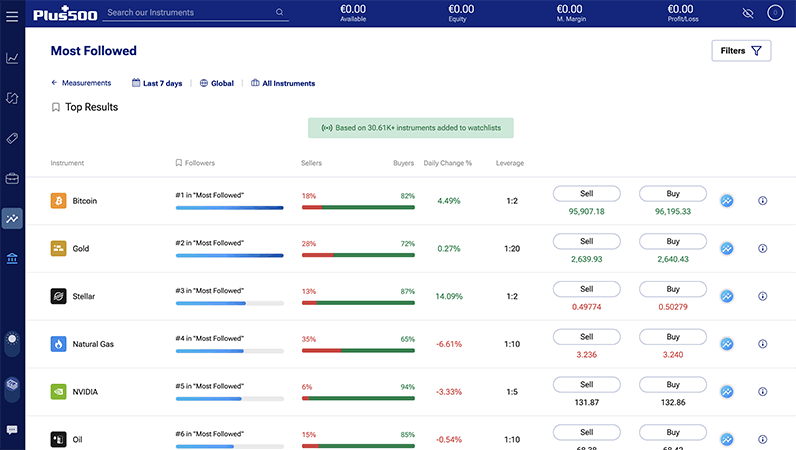
Does Plus500 charge commissions and fees?
Plus500 doesn’t charge a withdrawal fee and offers average forex CFD fees. After 3 months of inactivity, they charge a $10 quarterly inactivity fee. They also have a currency conversion fee of up to 0.7%.
When trading CFDs with Plus500, all costs are included in the spread; there’s no commission.
- S&P 500 CFD (average spread): 0.7 points
- EURUSD (average spread): 0.8 pips
Mobile trading app?
The Plus500 app is similar to its WebTrader version but falls short of industry leaders in advanced features.
It lacks synchronisation with web charts and essential features such as news and advanced trading tools.
Trading platforms?
The Plus500 WebTrader platform, designed for casual investors, offers features like pre-defined watchlists, client sentiment alerts, and a Dow Jones-linked economic calendar.
Although it provides 110 chart indicators and 20+ drawing tools, the settings won’t match the mobile app.
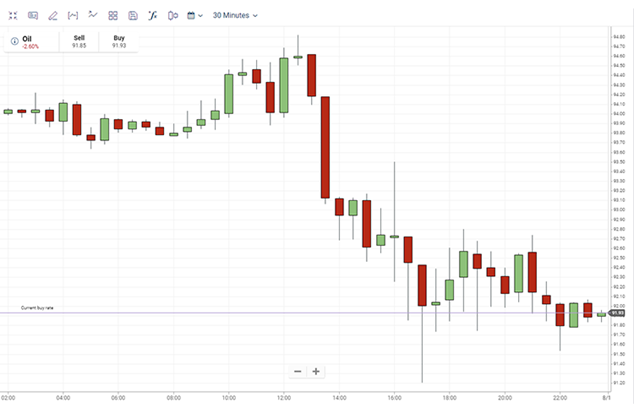
Plus500 has its own platform, which includes risk tools like trailing stops and guaranteed stop-loss orders but lacks support for algorithmic, social copy trading, and MetaTrader suite.
Research tools and educational content?
Plus500’s research is improving but still trails top industry players, lacking integrated forex news.
They’ve added sentiment features from Trading Central and FactSet and introduced the +Insights module for detailed trader statistics, including Trader’s Trends.
It offers client sentiment data, a Dow Jones economic calendar, daily fundamental analysis articles, and alerts for sentiment data changes.
Their educational content is limited compared to leading brokers, but they have introduced a Trading Academy with videos, webinars, articles, and feature content from the Corellian Academy on YouTube.
Their Trader’s Guide section contains several articles and about a dozen educational videos.
Which type of day trader is Plus500 best for?
Plus500 is best suited for intermediate traders seeking ease of use and simplicity, with its user-friendly platform and low minimum deposit for live accounts.
However, active traders wanting comprehensive market research might find the broker lacking.
It is important to note that while the platform is designed for user-friendliness, successful trading requires significant knowledge, experience, and an understanding of the potential risks involved in trading.
Read our Plus500 review.
Key rating criteria:
| Minimum deposit | S&P 500 CFD spread (average) | Commission | Types of assets |
|---|---|---|---|
| £100 | 0.7 | 0% | Forex, commodities, indices, options, stocks, ETFs |
Pros:
- No commission on buy/sell and low spreads
- Free unlimited demo account
- Over 2,800 trading instruments
- Real-time quotes and advanced analytics
Cons:
- No API integrations
- Lacks social copy trading
- No spread betting
5. Spreadex – Best for tight spreads

Spreadex, an award-winning UK day trading platform, is highly acclaimed for its exemplary customer service and efficient mobile app, making it a standout choice.
Is Spreadex safe?
Spreadex, established in 1999, is a trustworthy platform regulated by the UK’s Financial Conduct Authority (FCA). It has over 20 years of reliable conduct, although it doesn’t hold a banking license or disclose financial records publicly.
Its FCA regulation ensures protection up to £85,000, and it offers negative bank balance protection for added safety.
What can I trade on Spreadex?
Spreadex provides a wide array of CFDs and forex pairs. Although it doesn’t offer other assets like stocks and ETFs, its selection includes indices, shares, bonds, commodities, cryptocurrencies, and options. The range is substantial for forex and CFD traders.
Does Spreadex charge commissions and fees?
Spreadex stands out for its no non-trading fees policy. Deposits, withdrawals, and inactivity are all free of charge. While its CFD fees are slightly higher than some competitors, the transparency of its fee structure and competitive forex fees are notable advantages.
Mobile trading app?
The mobile app of Spreadex has won accolades for its reliability and user-friendliness. Its intuitive layout and customisability make mobile trading efficient, though it lacks biometric login features.
Trading platforms?
Spreadex’s web platform impresses with its sleek design and excellent search functionality. It allows extensive customisation and provides essential tools for effective day trading, including price alerts. The continuity between the mobile and web platforms enhances the trading experience.
Research tools and educational content?
The platform offers powerful charting tools with 39 technical indicators and a user-friendly interface for trading directly from charts. However, it falls short in providing trading ideas and fundamental data. Its educational content is comprehensive, but the absence of webinars and demo accounts might limit learning opportunities for new traders.
Which type of day trader is Spreadex best for?
Spreadex is best suited for active CFD and forex traders who value a mix of safety, comprehensive charting tools, and an efficient trading platform. It’s ideal for those who prefer a platform with strong customer service and are less reliant on fundamental research tools.
Key rating criteria:
| Minimum deposit | S&P 500 CFD spread (average) | Commission | Types of assets |
|---|---|---|---|
| £0 | 0.6 | 0% | Stocks, forex, ETFs, indices, commodities, futures, sporting events |
Pros:
- Wide range of CFDs and forex pairs
- Transparent, competitive fee structure
- Excellent customer service
- User-friendly interface
Cons:
- Limited market variety beyond forex/CFDs
- No demo account for practice
64% of retail investors lose money when trading spread bets and CFDs with this provider.
6. Trade Nation – Best for fixed spreads

Trade Nation, established in 2014, has rapidly become a prominent day trading broker in the UK, known for its commitment to transparency and customer-focused approach.
The platform is regulated by reputable global financial governance bodies, including the UK’s Financial Conduct Authority (FCA), ensuring a secure and credible trading environment.
Trade Nation stands out for its competitive, fixed spreads across various markets, offering clarity and consistency in trading costs without hidden fees or commissions.
The platform caters to both beginner and advanced traders, providing an easy-to-use interface with a full suite of advanced trading tools.
These tools include Smart News, an AI-driven feed for real-time market news, Signal Centre for actionable trading ideas, and an advanced charting package for in-depth technical analysis. Additionally, sentiment analysis tools and insights from Trading Central enhance traders’ ability to make informed decisions.
Trade Nation’s offerings include over 1,000 global marketplaces, making it an attractive option for traders looking for diversity in trading options. The platform’s fee structure is spread-only, with no separate commission charges, benefiting day traders with tighter spreads and lower transaction costs.
However, financing charges apply for overnight positions, and an inactivity fee is charged after 12 months of inactivity.
With 24-hour customer support five days a week, Trade Nation ensures traders have assistance whenever needed, along with resources like demo accounts for skill improvement.
The platform’s cloud-based trading system allows access from any device, ensuring flexibility and convenience.
While it may have limitations in product range and educational resources, its user-friendly web-based platform, great customer support, and negative balance protection make Trade Nation a competitive choice for day traders in the UK.
Key rating criteria:
| Minimum deposit | S&P 500 CFD spread (average) | Commission | Types of assets |
|---|---|---|---|
| £0 | 0.5 | 0% | Forex, CFDs on stock indices, stocks, commodities, bonds, crypto |
Pros:
- Fixed spreads
- Low-cost spread trading
- No hidden fees
Cons:
- A small selection of assets
75% of retail investor accounts lose money when trading CFDs with this provider.
How day trading works and whether it suits you
Day trading involves buying and selling assets within the same day, closing all positions before markets close. Traders aim to profit from short-term price movements driven by volatility, liquidity shifts, or news events. Success depends on speed, strategy, and risk control, while most losses stem from poor discipline and overtrading.
How day traders make money
Profits come from small, repeated price changes using methods like scalping, breakout, or mean reversion. Consistency, not large bets, drives success. Over time, small gains that exceed losses and trading costs create profitability.
Skills and tools you need
Effective day traders combine technical analysis, emotional control, and precise execution. Core tools include fast trading platforms like MetaTrader, cTrader, or broker systems (e.g., IG, XTB, Interactive Brokers), plus Level 2 data, hotkeys, and risk dashboards. Execution speed and platform quality often determine outcomes.
Is day trading profitable or too risky?
Day trading can be profitable, but it’s high-risk and requires strict money management. Only traders with a proven edge, clear strategy, and capital discipline tend to succeed. Always risk a small portion of your capital per trade and treat trading as a structured process, not speculation.
Risk warning: CFDs are complex instruments and come with a high risk of losing money rapidly due to leverage. Between 70–80% of retail investor accounts lose money when trading CFDs.
How to choose the right day trading broker
Choosing a regulated, low-cost broker is key to long-term success in day trading. Always start with FCA-regulated platforms, which ensure client fund protection, transparent pricing, and adherence to UK financial standards.
Look for brokers offering a broad range of instruments such as forex, stocks, indices, and commodities to match your trading strategy. Compare fees, spreads, and commissions, as even small differences can impact overall profitability. For active traders, spreads below 0.3% of target return are ideal.
A strong trading platform should provide real-time data, fast execution, and mobile access. Advanced platforms like MetaTrader, xStation, or IG’s proprietary system deliver tools for technical analysis and order management. Beginners should also prioritise brokers with demo accounts, education hubs, and market research.
Customer support and reputation matter too. Choose providers with 24/7 service and verified reviews on trusted sites. Finally, evaluate leverage options carefully, while it can enhance returns, it equally magnifies losses.
In summary: prioritise FCA regulation, low trading costs, fast technology, and educational support. Each trader’s needs differ, so choose the broker that aligns with your goals, risk tolerance, and trading style.
Which markets and strategies are best for day traders?
Day traders focus on high-liquidity markets with tight spreads and reliable volatility. In the UK, the most traded assets include the FTSE 100, S&P 500, DAX, GBP/USD, EUR/USD, gold, and crude oil. These markets provide consistent price movement and align with global trading sessions for optimal execution speed.
What are the most popular markets for UK day traders?
Most UK day traders use CFDs, forex pairs, and major indices due to their accessibility and leverage options. Forex offers 24-hour liquidity, indices deliver structured volatility, and commodities respond strongly to economic data. Professionals often trade DMA or futures contracts for faster execution and greater market depth.
Which day trading strategies actually work?
The most reliable strategies are mechanical and rule-based, not predictive. Common approaches include momentum breakouts, VWAP reversion, range trading, and news-based setups. Profitable traders backtest their methods, use fixed rules for entries and exits, and avoid emotional decision-making.
How can you manage risk while trading daily?
Effective day trading depends on strict risk control. Limit exposure to 0.25–0.5% of capital per trade, set daily drawdown limits, and enforce stop-loss orders on every position. Consistent risk management and discipline protect capital and sustain long-term profitability.
Final thoughts
Choosing the right day trading broker is essential for achieving consistent results in fast-moving markets.
The top FCA-regulated platforms, including eToro, XTB, and IG, combine low trading costs, fast execution, and advanced tools to support both new and experienced traders.
Before opening an account, compare spreads, platform features, and regulation status to ensure your funds are protected under FSCS coverage up to £85,000.
Always start with a demo account, refine your strategy, and focus on risk management before trading with real capital.
FAQs
What’s the best app for day trading UK?
The best day trading apps in the UK are eToro, XTB, and IG. All are FCA-regulated, offer low spreads, and feature mobile trading with fast execution.
What broker do professional day traders use UK?
Professional traders often use IG, Interactive Brokers, or Pepperstone for DMA access, tight spreads, and advanced charting tools.
Is day trading haram?
Day trading may be considered haram if it involves interest (riba) or excessive speculation (gharar). Some brokers offer Islamic swap-free accounts to comply with Sharia law.
Is day trading profitable?
It can be, but most traders lose money. Consistent profitability requires discipline, tested strategies, and strict risk control.
Is day trading gambling?
No, but without a structured strategy and risk management, it can become similar to gambling.
Can you day trade on Trading 212?
Yes. Trading 212 supports day trading in stocks, ETFs, and CFDs with zero-commission trades, though execution speed and order depth are limited compared to professional platforms.
Swing trading vs day trading – which is more profitable?
Swing trading is generally more stable and less time-intensive. Day trading offers faster gains but higher risk and costs.
How to learn day trading?
Start with demo accounts, free broker education hubs, and courses on technical analysis and risk management. Practice before trading real money.
How much can you make day trading with £1,000?
Returns vary widely. Realistically, new traders might earn 2–5% per month, though losses are more common early on.
Is eToro good for day trading?
Yes. eToro offers zero-commission trading, copy trading, and access to stocks, crypto, and forex, ideal for beginners.
Is Trading 212 good for day trading?
It’s suitable for casual day traders, but lacks advanced execution tools and Level 2 data needed by professionals.
How much can you make day trading?
Experienced traders may target 10–20% annual returns, but most retail traders lose money. Focus on risk management first.
How to read stock charts for day trading?
Learn candlestick patterns, support/resistance levels, and indicators like RSI or moving averages to identify short-term price trends.
How to start day trading with little money?
Begin with a demo account, choose a low minimum deposit broker (like eToro or XTB), and use micro-lot trading to manage risk.
How to use Bollinger Bands for day trading?
Bollinger Bands help identify volatility and overbought/oversold levels. Traders buy near the lower band and sell near the upper when confirmed by volume or RSI.
Why is pattern day trading illegal?
The Pattern Day Trader (PDT) rule applies in the US, not the UK. UK traders can day trade freely, provided they follow FCA regulations.
How to pick stocks for day trading?
Focus on high-volume, volatile stocks with clear intraday trends. Use news scanners and technical indicators to find opportunities.
You may also like:
Sources:








